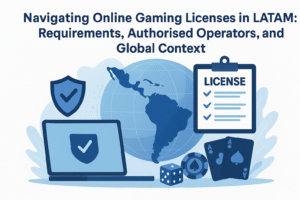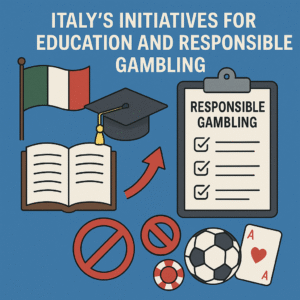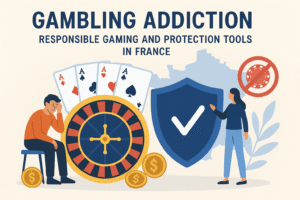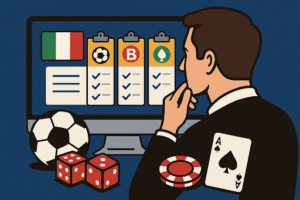Gambling Addiction, Responsible Gaming, and Protection Tools in France
Gambling in France is supervised by the Autorité nationale des jeux (ANJ), an independent regulator that manages both offline and online activities, covering casinos, horse-race wagering, sports betting, and other games of chance. The 2019 legislative overhaul expanded ANJ authority and obliged licensed operators to meet demanding requirements for technology, security, and consumer safeguards.To operate […]
Gambling in France is supervised by the Autorité nationale des jeux (ANJ), an independent regulator that manages both offline and online activities, covering casinos, horse-race wagering, sports betting, and other games of chance. The 2019 legislative overhaul expanded ANJ authority and obliged licensed operators to meet demanding requirements for technology, security, and consumer safeguards.
To operate legally, companies must secure an ANJ licence, follow anti-fraud and anti-money-laundering rules, integrate harm-prevention features into their products, and submit regular reports on key indicators. In practice, this means player safety is built into the regulatory model, not treated as an optional add-on.
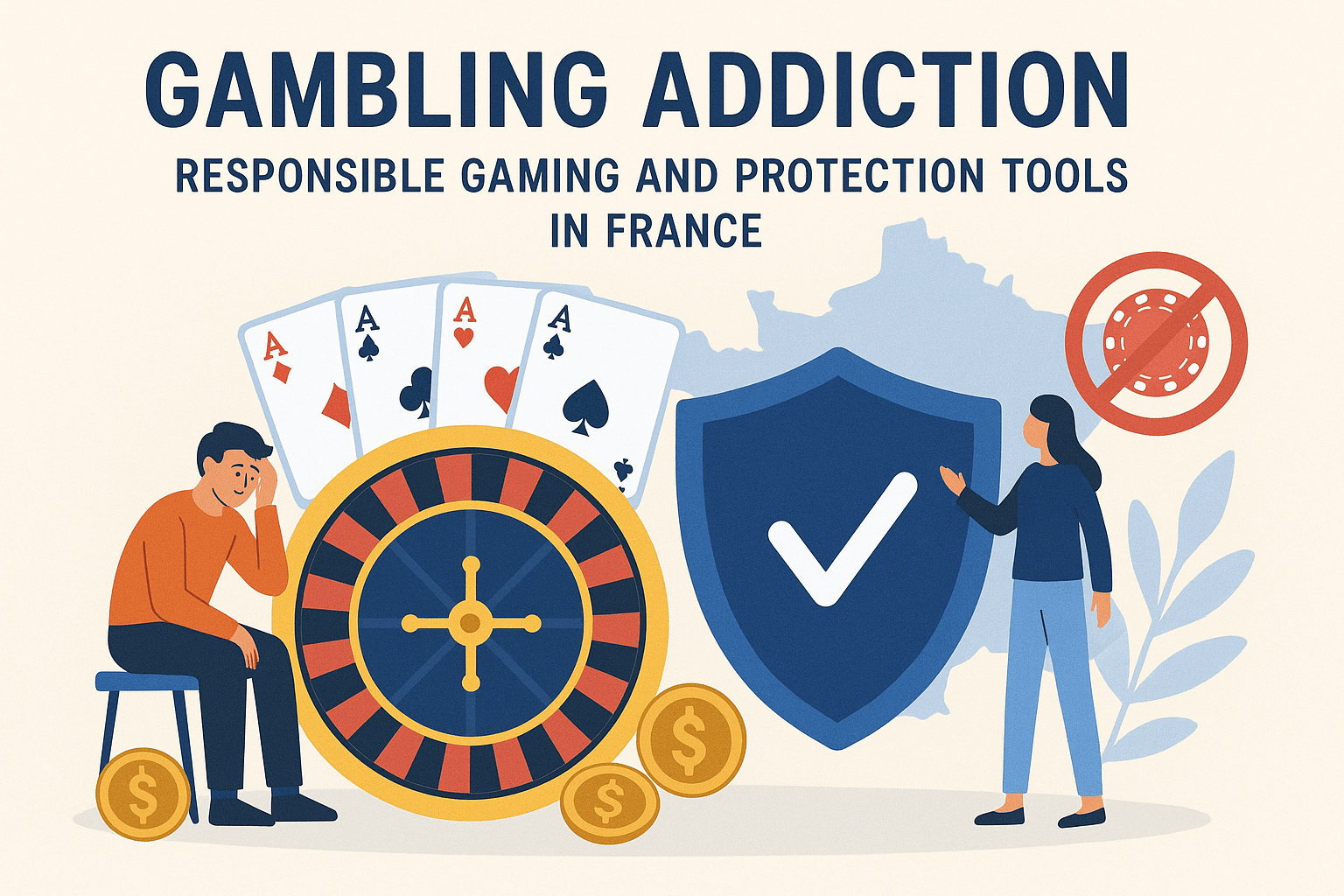
Recent trends and prevalence
The newest figures underline how common gambling remains across the country:
- In 2023, 51.6% of adults aged 18–75 said they had gambled at least once over the previous year, rising from 47.0% in 2019.
- The leading products are still lottery formats: draw games attract 34.2% of adults and scratch cards 30.9%. Sports betting accounts for 6.7%, while slot-machine play stands at 6.6%.
- Online participation has continued to grow. The regulated internet market recorded roughly 3.9 million active player accounts in 2024, which is a 7.7% year-on-year increase.
- Financially the sector is also expanding. Gross gaming revenue (GGR) reached close to €14 billion in 2024, up 4.7% compared with the previous year. Sports betting was one of the main drivers, with GGR in that category climbing by 14.8%.
- On problem gambling, the Canadian Problem Gambling Index (CPGI) remains the standard in France. Using this scale, about 5% of adult gamblers in 2023 were classified as at risk, split into around 1.7% moderate-risk and 0.8% high-risk. In population terms, that corresponds to roughly 810,000 moderate-risk adults and about 360,000 high-risk adults.
- Teen involvement has fallen but is still notable. Among 17-year-olds in 2022, 27.5% reported gambling during the year, down from 38.8% in 2017.
Taken together, the data point to two realities: gambling is firmly embedded in French life, and although the proportion of problem gambling has not surged, the large player base means that the number of affected individuals is substantial, and rising exposure could push risks higher over time.
Sports betting and online exposure
Sports wagering is a fast-growing vertical, boosted by mobile apps and in-play betting options. In this context, it matters that players are directed toward regulated services such as Betclic, Parions Sport, or Unibet. Using legal platforms helps protect customers and keeps operators accountable to ANJ standards.
Understanding Gambling Addiction
What is gambling addiction?
Gambling addiction, also referred to as gambling disorder or pathological gambling, describes repeated, persistent betting behaviour that continues even when it causes serious harm. Typical warning signs include needing larger bets to feel the same thrill, agitation or irritability when attempting to stop, failed efforts to cut down, chasing losses, risking jobs or relationships, and borrowing money from others to keep playing.
French public health monitoring uses the CPGI to place gamblers into risk categories, including moderate-risk and high-risk/problem gambling groups.
Why is France facing challenges?
Several forces are working together:
- The spread of online and smartphone gambling makes betting constant, convenient, and more impulsive.
- Younger adults are increasingly represented among those who choose voluntary self-exclusion, particularly within the 16–24 range.
- Sports betting has become culturally normalised through media coverage and sponsorships, which can make risks seem smaller than they are.
- Even with regulation, enforcement and real-world impact can lag. Reports note that prevention tools may exist on paper but sometimes deliver limited practical protection.
Impact on individuals and society
The harm from gambling addiction goes well beyond losing money:
- Financial fallout such as debt spirals, insolvency, and bankruptcy.
- Emotional damage, shame, guilt, anxiety, depression, and persistent stress.
- Social costs including conflict, relationship breakdown, workplace problems, and isolation.
- Wider public burdens through health-care demand, mental-health services, and links to fraud or crime in some cases.
One French testimony recounts a young bettor losing €16,000 in a very short period before turning to self-exclusion.
Even if problem gambling affects around 2.5% of French adults overall, that percentage still represents hundreds of thousands of people. From a public-health view, it is far from marginal.
Responsible Gaming in France
Definition and core ideas
Responsible gaming means gambling stays a leisure activity and does not become harmful. The fundamentals include:
- Clear and honest information about odds, rules, and RTP.
- Built-in self-limits for deposits, losses, and time spent.
- Strict age checks to prevent under-18 play.
- Ongoing monitoring of behaviour, with interventions when risk patterns appear.
- Easy access to cooling-off options, self-exclusion, and support services. Both operators and the ANJ stress that gambling should remain entertainment, not a source of damage.
Operators’ obligations under ANJ
Licensed companies are required to implement responsible-gaming systems, including:
- Tools that let players set deposit caps, loss thresholds, and time limits.
- Self-exclusion routes and temporary cooling-off arrangements.
- Detection and flagging of unstable patterns such as rapid stake increases or repeated chasing of losses.
- Reliable age verification and safeguards against minors gambling.
- Visible responsible-gaming guidance and direct links to support contacts.
The ANJ strategic plan for 2024–26 places special emphasis on cutting excessive gambling and reinforcing protections for minors.
Limitations and critiques
Despite the framework, critics highlight weaknesses. Prevention features can be delivered as “minimum compliance” rather than active harm reduction. Default limits may be set high, warnings can be easy to miss, and self-exclusion may be undermined when players shift to unlicensed sites.
As one user interview in France noted:
“En une petite heure j’ai perdu 16 000 euros … et la notion du réel.” (In one hour I lost 16 000 euros … and touch with reality).
This underlines that tools only work when they are visible, properly enforced, and genuinely used.
Responsible Gambling across the World
Canada
Gambling oversight in Canada is mainly provincial, with the federal Criminal Code setting the overarching boundaries. Online gambling is legal but governed differently depending on province, creating a patchwork system. Ontario, for instance, runs a regulated iGaming market through the Alcohol and Gaming Commission of Ontario and iGaming Ontario.
Most provinces offer strong protection measures such as self-exclusion schemes, limit settings, and behavioural monitoring. British Columbia’s Lottery Corporation (BCLC) “GameSense” programme is one example, providing education, counselling access, and self-exclusion for at-risk players.
Canada is currently debating stricter advertising rules, including possible bans on celebrity or athlete endorsements aimed at reducing exposure for vulnerable groups.
Mexico
Mexico’s gambling market is developing and offers a contrasting Latin-American picture. A national ENCODAT survey from 2016–2017 found that 24.5% of people aged 12–65 had gambled at least once, while about 0.3% met pathological gambling criteria (with adolescents slightly higher at around 0.4%).
Gambling is authorised under the federal Ley Federal de Juegos y Sorteos (1948), but online regulation remains less advanced. Monitoring tools exist in places, yet youth participation and gaps in online-specific controls raise concerns about future risk.
Italy
Italy represents a tightly regulated European model. The Agenzia delle Dogane e dei Monopoli (ADM) licenses and supervises gambling across online betting, sports wagering, and casinos.
Recent reforms, including Legislative Decree No. 41/2024, are designed to reduce operator numbers, strengthen licensing rules, and expand harm-prevention tools such as self-exclusion and personalised limits. Planned upgrades include tailored exclusion periods (7 days up to 270 days or permanent) and product-specific exclusion options beginning in February 2026 through a Single Self-Exclusion Register.
Italy also limits exposure through the 2018 “Dignity Decree,” which restricted gambling advertising and sports sponsorships. The Italian approach shows how strict licensing plus robust exclusion tools can actively reduce harm, useful lessons for France, especially around sports-media visibility.
Brazil
Brazil is going through a transition phase as sports betting scales rapidly. Although online fixed-odds sports betting was legalised in 2018, full regulation has moved slowly. In 2024, the government signalled it would suspend unauthorised firms and introduce tougher controls, including banning betting funded by credit cards or loans.
The Finance Minister has stressed an “urgent need to bring order” because of rising reports of gambling-related health issues. Brazil illustrates how sudden betting booms, driven by sponsorships and mobile access, often trigger swift public-health and regulatory pushback.
Switzerland
Switzerland is among the most developed European systems for both online and land-based gambling safety. The Swiss Gambling Act, effective from January 2019, legalised online gambling only through Swiss-licensed operators and actively blocks foreign unlicensed sites.
Operators must provide self-exclusion, deposit and time limits, real-time behaviour monitoring, counselling access, and direct interventions. “Swiss4Win” is often cited as an example of these standards in practice.
A Swiss study reported very low past-year rates: 0.7% at-risk gambling, 0.1% problematic gambling, and 0.02% pathological gambling among adults, among the lowest internationally.
United Kingdom
The UK has a long-established responsible-gambling system under the Gambling Act 2005, regulated by the UK Gambling Commission (UKGC). All legal online operators must be UKGC-licensed and provide core safety tools: strict age/ID checks, clear safer-gambling messaging, easy time-outs, deposit/loss limits, and “reality check” spend-and-time prompts.
A key protection is GAMSTOP, the national online self-exclusion scheme. Every UK-licensed online casino and sportsbook must participate, so one registration blocks access across the regulated market. Uptake is substantial, with hundreds of thousands enrolled and continued growth in recent years.
Following the government’s gambling reform white paper, protections are tightening further. Measures include stronger financial-risk and vulnerability checks and an online slots stake cap to reduce harm (lower limits for 18–24s than for older adults). Advertising is also restricted through tough marketing codes and the “whistle-to-whistle” TV ban during live sport, while support is provided by GamCare, GambleAware, and NHS gambling clinics.
Summary Table
| Country | Regulatory model | Key protection tools | Notable Insight |
|---|---|---|---|
| Canada | Provincial/fragmented; online growing | Self-exclusion, counselling (e.g., GameSense) | Advertising regulation emerging |
| Mexico | Federal law; online less mature | Some monitoring, but youth risk high | Youth exposure is a major concern |
| Italy | Unified regulator (ADM); recent reform | Self-exclusion, personal limits, ad controls | Tight licensing + harm reduction focus |
| Brazil | Transitional regulation of sports betting | Tightening oversight, blocking credit-card bets | Sports-bet boom triggers regulatory action |
| Switzerland | Mature legal framework (2019 law) | Real-time monitoring, self-exclusion, limit tools | One of the lowest harmful gambling prevalence rates |
Protection Tools for Players and Their Circles
Self-exclusion and voluntary bans
Self-exclusion is one of the strongest safeguards: a player chooses to block themselves from gambling for a fixed period or permanently. In France, the ANJ manages this system for both online platforms and physical venues. Since 2021, around 60,000 people have used the voluntary ban option.
Its effectiveness depends on players not migrating to unlicensed websites or to venues beyond the regulated network.
Deposit and time limits, plus monitoring
Operators must provide tools that allow users to set boundaries in advance, daily or monthly deposit limits, maximum losses, and session-time caps. When used consistently, these guardrails help prevent betting from drifting into riskier territory.
Platforms also monitor behaviour indicators like rapid stake escalation, repeated large losses, or chasing patterns. When these signals appear, operators are expected to intervene or alert the player.
Choosing licensed and safe platforms
A practical and powerful safety step is to gamble only with legal, ANJ-licensed operators. Unlicensed sites are not required to offer the same protections, and the regulator continues to block illegal services and enforce compliance. If you reference rankings of betting providers in sports-media work, it’s essential to verify licence status, responsible-gaming tools, and access to support.
Help and treatment services
For anyone experiencing harm, or supporting someone who is, France provides several routes:
- Joueurs Info Service: a free, confidential helpline (09 74 75 13 13) and website that offers screening tools and directs people to care.
- Local addiction treatment centres (centres d’addictologie), financial-counselling services, and peer-support groups.
Acting early matters. Red flags include borrowing for bets, hiding gambling, neglecting responsibilities, or feeling restless without play.
Prevention campaigns and research
The ANJ and the Observatoire français des drogues et des tendances addictives (OFDT) regularly track gambling trends, publish public reports, and run awareness campaigns. Their 2024 briefing highlighted continued market growth and reinforced the need to curb excessive gambling. Education efforts increasingly focus on younger players, parents, and media professionals to reduce exposure and encourage safer habits.
Practical Steps for Responsible Gambling in France
Before you bet
- Choose a legal, ANJ-approved operator; consult trusted review lists such as the one on the best sports betting sites in France.
- Set a clear budget and accept in advance what you are prepared to lose.
- Learn the basics of the game: odds, house edge, and realistic loss risk.
- Check your motivation: “Am I doing this for fun, or to chase money, excitement, or proof?”
- Avoid betting when stressed, emotional, tired, or under the influence of alcohol.
While you gamble
- Activate deposit and time limits where possible.
- Keep an eye on your pattern: are stakes rising, time stretching, or thoughts becoming obsessive?
- Take regular breaks to reset perspective.
- Don’t borrow money to gamble and don’t frame betting as a way to “win back” losses.
- If control feels shaky, step away, self-exclude, or reach out for help.
If things go wrong
- Acknowledge the problem early, especially if you keep gambling despite clear negative effects.
- Call Joueurs Info Service or contact a treatment centre.
- Tell someone you trust and agree on boundaries together.
- Consider professional therapy, money-management support, or peer groups.
- Use self-exclusion to force a pause and create space to recover.
- Identify triggers, boredom, stress, emotional lows, the urge to “fix” losses, and work on those underlying drivers.
Conclusion
Gambling is a mainstream pastime in France, but it carries real danger when it stops being recreation. With more than half of adults gambling each year and hundreds of thousands showing harmful patterns, enjoying betting safely and avoiding addiction is a growing priority.
France’s regulatory system through the ANJ is strong, and protection tools like self-exclusion, limits, and behavioural monitoring are widely available. Still, their success depends on firm enforcement from operators and active awareness from players.
For individuals, the essential rule is straightforward: set boundaries early, stay alert to changes in behaviour, choose legal platforms, and respond quickly if warning signs appear. If gambling is starting to feel like more than a game for you, or someone close to you, support exists, and using it sooner can make all the difference.


